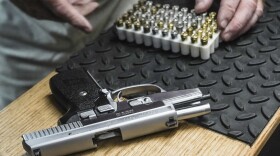"The truth is I don't always want the audience on my side. That's not a very dynamic state. A better state is where some are on your side, some are skeptical, some are listening intelligently and are very present, others are reflecting - there's a mixture. That's what creates the atmosphere where something unexpected can happen." - Mike Daisey
Mike Daisey is an award winning storyteller and monologist. He is probably best known for an episode he wrote and performed for This American Life about an Apple factory in China. After that story aired, flaws in Daisey's account were made public. .
Daisey is back with a new show, . That show had its world premiere this week at in Chapel Hill and runs through Sunday.
Daisey talked with Phoebe Judge about his new show and the old controversy.
The story of guns is actually central to the heart of the American story. We are defined in many ways by our relationship with guns. By our unwillingness to confront the heart of our relationship. And our inability to have a public discourse about guns that is substantive. We don't want to talk about guns, ever, and then when we're forced to, we have to, and then we stop talking about it as soon as we can. - Mike Daisey
The show is un-scripted, it relies on comments and stories from the audience, so each show is different, and the monologues are created extemporaneously. "The execution each and every night is unique unto itself. In that sense, it's a lot like jazz," Daisey says.
Mike Daisey grew up in northern Maine. He says that when he was a kid, in the fall, other kids would go hunting in the mornings before school. There were rules at school, if a kid went hunting before school, they had to leave their rifle in their locker. (Students were not allowed to show each other their guns, although they had them in school.)
Addressing Controversy
ĽŞ˛ĘÍřÍřŐľ's Phoebe Judge asked Daisey directly about the This American Life saga.
Judge: How has that experience changed your work?... About having to go on and confront someone who is saying 'you lied, why did you do that?' Has it changed the way you operate at all? Or not?
Daisey: It affected every part of my life. It's been a...it was huge, it was a huge experience to go through.
Judge: Has it made you more wary about the way that you will construct a monologue? Because you don't want to go through something like that again? And has it in some way inhibited the way that you can perform? ...'I have to be more careful about what I say because even if I want to say it, maybe somebody's going to come and charge me with something, and I am going to get thrown into something I never wanted.
Daisey: It's made me more wary of journalists.
Judge: Fair enough.
The material in the newest show, "The Story of the Gun," is a combination of facts and fiction. Daisey has meticulously researched the history of guns.
"As for the stories, all stories are fiction. As everyone who tells stories in any context knows, that by the time you are done editing and shaping and forming, narrative authority ultimately lies in the person telling the story," he says.











